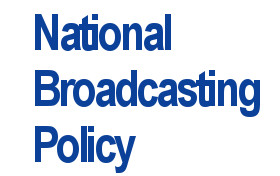Published: 14 August 2014
The government should form a fully independent National Broadcasting Commission (NBC) entrusted with the task of drafting the National Broadcasting Policy (NBP) in consultation with stakeholders. TIB made this demand at a press conference to spell out its stance over the newly adopted ‘National Broadcasting Policy 2014’ on 14 August 2014 at a hotel in Dhaka. TIB also demanded to enact law to facilitate the formation of NBC. The anti-corruption watchdog believes that the NBP contains a few articles which go against Chapter 39 of the Bangladesh Constitution that ensures freedom of thoughts and conscience. Dr S M Rezwan-ul- Alam, Director, Outreach and Communication presented TIB’s position on NBP. Advocate Sultana Kamal, Chairperson, Board of Trustees; Dr Iftekharuzzaman, Executive Director; Dr Sumaiya Khair, Deputy Executive Director and Meer Ahsan Habib, Senior Programme Manager, TIB were also present during the press conference.Earlier on 2 October 2013, TIB sent a critical review with a set of recommendations on the draft NBP to the Information Minister. In a press statement on 21 October, the minister thanked TIB for its role and subsequently on 29 January, TIB also formally requested the minister to update about the status of recommendations. Regrettably, no response was made and finally, the government finalised the NBP through a gazette notification on 6 August ignoring some of TIB’s key recommendations including formation of NBC in the first place. However, the NBP more or less accepted 5 recommendations of TIB on background, licensing, broadcasting of news and information related programmes, advertisement and rights of women and children.The NBP contains a number of positive aspects including upholding the spirit of Liberation War, promote Bangladeshi culture, adherence to state principles, respect towards all religions, promote equality in the society etc. Besides, the policy also gives special emphasis to broadcast developmental programmes specially empowerment of women, disable and the marginalised. |
It also attempts to protect the rights of the consumers by including a guideline on broadcasting of advertisement. Another commendable thing is the provision of following National Women Development Policy and National Children Policy.The position paper revealed that the NBP is neither unique nor industry friendly rather, a policy document of the government based on existing rules, policies and acts such as Bangladesh Television Film Censor Rules 1985, Policy for Broadcasting Foreign Films in Bangladesh Television 1988, Amended Television Advertisement Policy (proposed), Ordinance for Cable Television Network Operation and Related Regulations 2006, Policy for Commercial Operation of Bangladesh Betar 1989, Programme Policy for Radio Bangladesh and Bangladesh Television 1986 etc.
TIB sent a critical review with a set of recommendations on the draft NBP to the Information Minister for government’s consideration. In a press statement on 21 October, the minister thanked TIB for its role and subsequently on 29 January, TIB formally in a letter requested the minister to update about the status of recommendations. Regrettably, TIB did not get and any answer and ultimately the government finalised the NBP through a gazette notification on 6 August ignoring TIB’s key recommendations including formation of NBC in the first place.
Although there are 13 objectives and 4 strategies to attain these, but they do not supplement each other. There is no guideline on how to promote level playing field for private and state owned broadcasting channels; similar is the case with private-public partnership; no explanation of the innovative model to be applied for bringing transparency and accountability within the industry etc. |
|
TIB's position on National Broadcasting Policy 2014 (Bangla Presentation)
TIB's position on National Broadcasting Policy 2014 (Bangla Position Paper)








